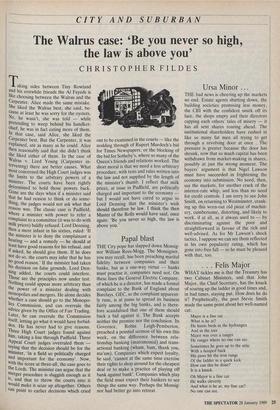CITY AND SUBURBAN
The Walrus case: 'Be you never so high, the law is above you'
CHRISTOPHER FILDES
Taking sides between Tiny Rowland . and his erstwhile friends the Al Fayeds is like choosing between the Walrus and the Carpenter. Alice made the same mistake. She liked the Walrus best, she said, be- cause at least he was sorry for the oysters. No, he wasn't, she was told — while pretending to weep behind his handker- chief, he was in fact eating more of them. In that case, said Alice, she liked the Carpenter best. But the Carpenter, it was explained, ate as many as he could. Alice then reasonably said that she didn't think she liked either of them. In the case of Walrus v. Lord Young (Carpenter in- tervening) there are better causes. What most concerned the High Court judges was the limits to the arbitrary powers of a minister. The courts have been rightly determined to hold those powers back. Gone are the days when if a minister said that he had reason to think or do some- thing, the judges would not ask what that reason was. The classic case is Padfield, where a minister with power to refer a complaint to a committee (it was to do with Milk prices) baldly refused. Lord Denning, then a mere infant in his sixties, ruled: 'If the minister is to deny the complainant a hearing — and a remedy — he should at least have good reasons for his refusal, and if asked, he should give them. If he does not do so, the courts may infer that he has no good reason.' If the minister had taken his decision on false grounds, Lord Den- ning added, the courts could interfere. Those are the principles now under test. Nothing could appear more arbitrary than the Power of a minister dealing with Monopolies and mergers. He alone decides Whether a case should go to the Monopo- lies Commission, and can overrule the advice given by the Office of Fair Trading. Later, he can overrule the Commission itself, letting go what it would have forbid- den. He has never had to give reasons. Three High Court judges found against him, taking a line through Padfield. Three Appeal Court judges overruled them saying that the decision should be for the minister, 'in a field so politically charged and important for the economy'. Now, with the score at three-all, the case goes to the Lords. The minister can argue that the merger procedure is sluggish enough as it 15, and that to throw the courts into it would make it seize up altogether. Others can point to earlier decisions which cried
out to be examined in the courts — like the nodding through of Rupert Murdoch's bid for Times Newspapers, or the blocking of the bid for Sotheby's, where so many of the Queen's friends and relations worked. The short moral is that we need a less arbitrary procedure, with tests and rules written into the law and not supplied by the length of the minister's thumb. I reflect that milk prices, at issue in Padfield, are politically charged and important to the economy but I would not have cared to argue to Lord Denning that the minister's wish should therefore be law. I think the then Master of the Rolls would have said, once again: 'Be you never so high, the law is above you.'

















































 Previous page
Previous page